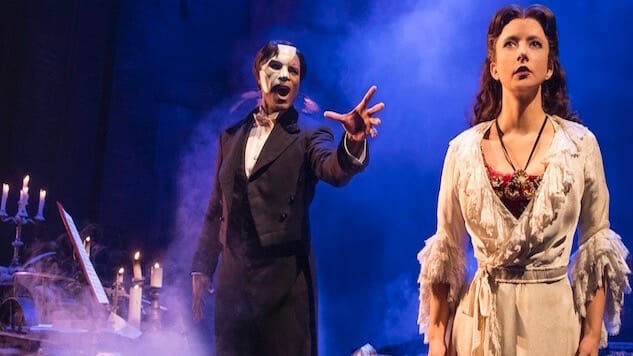Derrick Davis on Playing The Phantom of the Opera
Matthew Murphy
Derrick Davis will never forget the first time he saw The Phantom of the Opera. “I remember sitting in the front row with my family and feeling completely captivated by the magic and the mystery of Andrew Lloyd Webber’s work,” he says. “It was, without a doubt, a turning point for me.” The second he got home he penned a letter to then Phantom Davis Gaines, who returned a letter to Davis with a signed headshot—the same one Davis travels with today while performing as the Phantom for the show’s 25th Anniversary Tour, which is passing through 16 more North American cities through August. “After seeing the show 14 more times after that, I’m now a part of the company,” says Davis. “It’s definitely a dream come true.”
Here, we catch up with the Long Island native about what it means to be the first African American actor ever to play the Phantom on tour, the staying power of Andrew Lloyd Webber’s music, and why we all may have much more in common with the masked maestro than we might believe.
Paste: You’ve played both Mufasa and Scar in Disney’s The Lion King—meaning you have experience in becoming the good guy and the bad guy. The Phantom represents both of these characteristics—how do you step into a role that is so dichotomous in nature?
Davis: When an actor approaches a role, there’s the actor’s wealth of life experiences that instantaneously defines certain things for that role. In researching a bit about the Phantom, I found so much of myself in the character. There’s the aspect of unrequited love; there’s something about himself he’d rather hide from society in order to get ahead; he’s brilliant at what he does but before society sees or hears his brilliance, they first see his disfigurement.
I think that one of the major reasons the show has been such a worldwide success is because the Phantom has very relatable characteristics, whether the audience realizes this or not. Viewers walk away from the production with a cathartic experience—they feel light or free, or at least not alone.
Paste: What is it about Andrew Lloyd Webber’s music that works as well today as it did more than two decades ago?
Davis: These melodies are the most incredibly complex melodies, and he married them with complex orchestration that undergirds the melodies. The music alone is so excellent at telling the story without words in the emotion that each line carries. If you made it a silent film and just played the music, you would get the same emotion because it’s so well-penned. It’s a timeless masterwork.
Paste: Which song were you most excited to prepare for when you began your work in the role?
Davis: “Music of the Night” is one of the more famous ones the Phantom sings, and it’s one of the most daunting songs I’ve had to sing in my entire career. It’s very naked and very exposed, and the orchestration leaves so much room for the audience to really hear and absorb the text. It really leads the singer out there—it’s do or die. Christine is not responding to what I’m singing, so I have to get through the entire piece and convey this emotion not just with words, but with the way I use my voice. It’s become one of my favorites because, when I can do it correctly, the the audience is captivated by it.
-

-

-

-

-

-

-

-

-

-

-

-

-

-

-

-

-

-

-

-

-

-

-

-

-

-

-

-

-

-

-

-

-

-

-

-

-

-

-

-








































